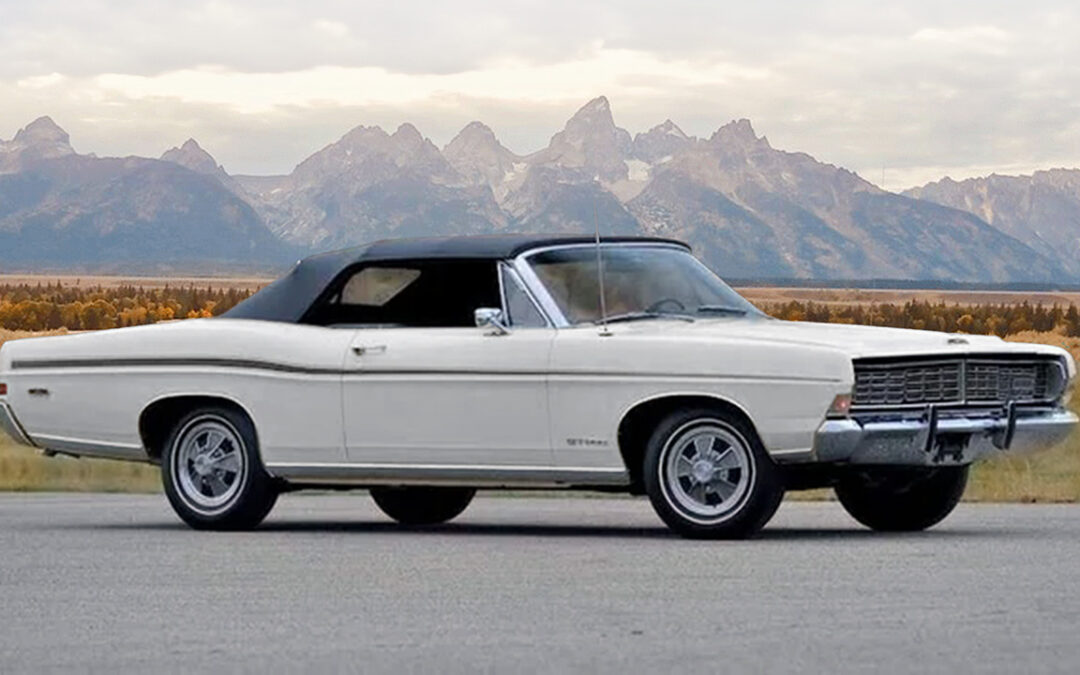
by Robert Bowie, Jr. | Jul 25, 2023 | Featured, People, Personal, Travel
Years ago, I met a boy who never once told me the truth but had the heart of a saint.
Back in August 1968, outside of Cheyenne, Wyoming, I was hitchhiking east when a state trooper pulled up next to me. He told me that he was going down the highway for 15 minutes, then turning around, and if I wasn’t gone by the time he came back he was going to lock me up in Cheyenne “until I got a court date.“
This was serious.
As the officer’s taillights disappeared down Interstate 80, I turned around to face the empty road and stuck out my thumb.
I needed a miracle.
As the first car approached, I knelt by the side of the roadway with my hands pressed together simulating prayer.
That car, an old white Ford convertible, was driven by a boy who appeared to be in his mid-20s. He wore a huge cowboy hat, and rhinestones from his shirt collar to his new boots. The boy pulled over and waved for me to get in.
As I thanked him and started to explain my predicament, he laughed and waved off any further conversation. He told me not to worry because he would be driving all night to see his father in Fort Dodge, Iowa.
First car? This guy? It was a miracle… but it gets better.
Next, he asked me if I was hungry. I laughed and nodded yes, and he reached under his seat to hand me a can of peaches, a can opener, and a plastic fork.
He was clearly showing off. You could tell by the grand gestures of his performance and his broad grin. He was having fun.
After I finished the peaches and drained the can of its last sweet syrup, I settled into the ride as he started to talk. He told me that he had been a foreman for the last several years at a ranch, and the night before in Reno, he had girls in the front and back seats of this very car because he had won money in the slots.
As we drove deeper into the night he told me that before he had been a cowboy he had been a soldier of fortune, and had parachuted into Nicaragua as an agent for the CIA.
His stories were endless and detailed, full of life and love and compassion for those he had worked with, and for the women he had been fortunate to love, as well as those who had broken his heart but had been kind enough to have loved him back for a while.
He was a natural storyteller and the more we relaxed together and talked, the more I liked him for his joy.
Slightly before dawn, when we turned off the Interstate and headed up toward Fort Dodge, he offered a surprising apology: “My old man never amounted to much. He was a postal worker. He drank himself out of the job but he’s always been there for me. He is sick now. I never knew my mom. She left him, but my father, he always has been there for me.”
As the light brought color into the outskirts of Fort Dodge, we turned onto a street of freestanding houses in an empty neighborhood with untended lawns, litter on the streets, and an occasional abandoned car.
The door to his father’s house was open and the window next to the front door was broken. As we entered, I looked to the right. There was a kitchen with a table and two chairs. To the left was a living room with no furniture. Straight ahead was a staircase with a simple railing and some of the slats missing, which led to a second floor. There were crushed beer cans on the floor and heaping ashtrays on the countertop by the sink.
The boy headed upstairs to go wake up his father. Moments later, there was some heavy coughing from upstairs and muffled voices. There was the sound of crying, raised voices, but also laughter.
After several minutes, an old man slowly navigated the steps and stopped to catch his breath when he reach the bottom step.
The old man apologized for the state of the house and immediately went the the old ice box. He got three beers and proceeded to handed them out. Apparently, these were breakfast beers.
Oddly, the whole house seemed to be filled with love and I felt welcome.
As the sun came up, the two were lost in each other’s company, and so I timidly asked if I might be allowed to take a shower since I had been on the road for several days. The old man responded “Sure!” He lit a cigarette and pointed at a wash tub leaning against the kitchen wall. He told me to fill it with hot water from the sink and handed me a big jug of dish washing detergent.
I felt that I could not refuse the kindness. I filled the tub with warm water and detergent, stripped naked, and started to take a bath. The boy and his father paid no attention as they laughed and talked and smoked.
Almost immediately the police arrived, knocked on the unlocked door, then entered. They arrested the boy, put him in handcuffs and shoved him through the door toward the squad car out front. The old man burst into tears. With a beer still in hand, he begged them to release his son as the officers pushed the boy down the walkway and put him in the back seat. The officers never spoke to the pleading old man except to say. ”If you touch me, I will take you in too.”
During the entire arrest the police paid no attention to me at all as I sat naked in a wash tub and tried to surround myself with heaps of bubbles.
When the old man returned from the street, he explained through his tears that a week ago his son had finally been released on parole from a Kansas prison. He had been thrown out of school several years before, and had been convicted as an adult for smoking marijuana near the school yard. He wasn’t a bad kid. Just a free spirit from the wrong side of town.
His father had gotten the old convertible for him and told him he could never outlive his past in Kansas. He told him to go west and “disappear” and never come back again.
The boy had initially agreed, but he had told his father upstairs that he had become homesick for the old man and he was afraid he would die and the boy would never see his father again.
Everything the boy had told me for the last 12 hours riding through the night was a lie, and also a life he would never have the chance to live.
The old man said he and his son had talked every week during the boy’s incarceration and the boy had told him he read all the books and magazines and newspapers he could find in prison.
After the old man had fortified his courage with a few more beers, he marched out the front door and headed toward the police station, which was apparently several miles away.
Alone in the empty house, I dried off with paper towels, slept a little on the living room floor, then in mid afternoon, hitchhiked to a postal delivery hub. I got a ride from a man driving a Mail truck headed east toward Chicago. He told me he’d gotten married the day before, and had been up all night. When the driver started to hallucinate dogs running across the Interstate, I volunteered to drive so he could sleep. We switched seats without stopping.
As dawn arrived, with the sleeping driver by my side, I thought about the boy and wondered why he would lie to me all night about a life he never lived, then take me to his home where his lies surely would be revealed.
Maybe it was to show he had a kind heart and a moral code, despite his life. Maybe he just gave up and didn’t care. As the sun was coming up in the cab of that mail truck, I realized that I had never asked his name, nor had he asked me mine.
Years later, it occurred to me that no matter how hard I might try, I would never be able find that boy again.
I still think of him often. He was one of the kindest people I have ever met. He has appeared in my poems and plays as a reminder that we really are what we do, not what we say.
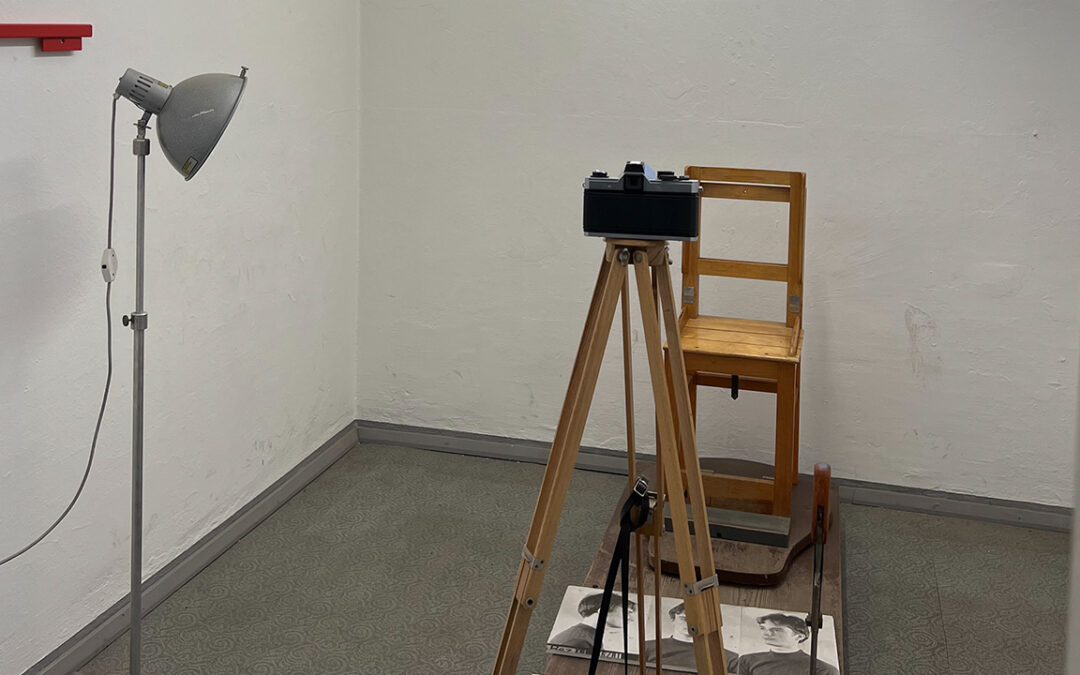
by Robert Bowie, Jr. | Jul 11, 2023 | Featured, Personal, Politics, Travel
Last month I took a trip because I wanted to “feel” what it was like to live in WWII Germany and the Soviet Cold War occupation in Czechoslovakia and Poland.
I already knew the dates, places and times from textbooks, but it’s quite different to experience what it was like to have lived during those times.
Of course the trip would come alive in museums and, unexpectedly, it brought back for me a long lost feeling I had years ago when I was just a young boy. I had gotten lost off shore in Buzzards Bay in a small motorboat that was running out of gas on an outgoing tide in thick predawn fog.
It is odd how we learn through memories and association.
How odd that museums, which were about imprisonment, brought back the feeling of drifting out to sea, creating an odd claustrophobia without barriers other than an endless borderless fog.
The claustrophobia slowly kicked in when I visited Checkpoint Charlie, the famous heavily guarded passthrough in the Berlin Wall, which kept the East Germans imprisoned inside.
It started with a set of pictures of a boy who had scrambled to climb the wall in an effort to live in freedom, but the photos chronicled how he had died riddled with bullets, hanging from barbed razor wire near the top of the wall.
How odd that I could feel claustrophobic under wide-open skies?
A few days later, the claustrophobia increased in one of the East German museums that focused on the Nazi SS and their little gray bread trucks. These had no windows, just a sliding door on one side and three closet-sized cells so small that prisoners could not stand but only sit in a narrow chair, hands by their sides, while they were taken to a concentration camp somewhere outside of Berlin.
A few days later as we traveled toward Prague, we stopped at another prison that was three or four stories high with interrogation cells on the top floor. The inmates who would not answer were showed pictures of their family who would be killed if they continued to resist.
Putin had spent six months in the house across the street when he was in Soviet intelligence, attempting to flip the tortured inmates to become Soviet spies.
The claustrophobia wrapped around me in that silent building when I realized what it must have felt like day and night in there. It was missing the noise of slamming cell doors, the echoing screams and the smell of the single bucket in the corner, which acted as a bathroom in each cramped cell, with three to a single bed and no mattress.
I know now why the feeling I had on this trip was claustrophobic but I thought it was still an odd reaction to the history of the past until I realized I had lived my whole life free in a democracy.
All of a sudden, I felt imprisonment under borderless wide open skies as a psychological imprisonment which became unbearable.
All of a sudden, I could feel the last breath of the boy crucified and bleeding from razor wire on the top of a Berlin Wall as a reaction to my claustrophobia and his death.
Years ago, as I slowly ran out of gas in my little boat, I saw the outline of a cliff as the late morning fog broke. There were connected ladders and a climbing set of stairs. I beached the boat and climbed to the top of the cliff and knocked on the door of a little cottage overlooking the ocean.
A woman with the Sunday newspaper tucked under her arm answered the door. I breathlessly asked, “Where am I?” She looked at me quizzically and answered “Menemsha,” then paused, “Martha’s Vineyard,” and then paused again… “The United States of America.”
I remember feeling happy and alive.
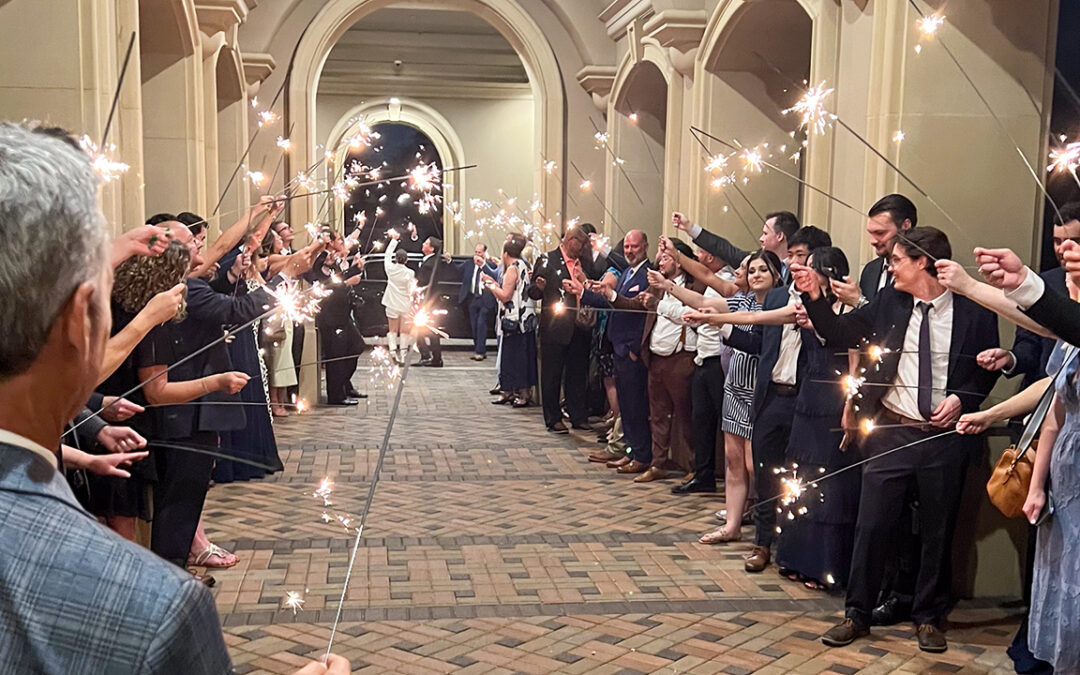
by Robert Bowie, Jr. | Jul 4, 2023 | Featured, Personal, Travel
I have not posted a blog in the last three weeks because I have been to hell and back. I traveled to the darkest place I’ve ever been, and then returned to a place of joy, laughter, love and light.
I went on a trip through World War II in Germany, Czechoslovakia, and Poland, and then returned to witness my son’s wedding and its explosion of joy.
History as dates, places and times is taught and graded, but only the imagination can bring it to life and give it meaning.
In Poland, at the end of our trip, I went to Auschwitz, the concentration camp.
Auschwitz had the most efficient business plan I have ever seen.
I stood at the exact location where the trains emptied, and a guard made an instantaneous decision, pointing either left or right. To the left went children and their mothers (if their mothers could not work) to the gas chambers. To the right went men and women who could be worked to death. The life expectancy of those who could work was pre-calculated to be three months. Excess food was not waisted on them since there was an endless supply of new labor coming off the trains each day. They killed thousands upon thousands of these people each week.
Inside the camp today, there are multiple display cases. Behind the glass of the display cases are piles of clothes, shoes or pots and pans, which had been carried by the executed. In one display case, among the scattered clothing, there was a little pair of red children’s shoes unbuckled. In another, a perfectly intact three-foot-long braid of hair cut from the scalp of a young child. It had a light blue bow still in place at the end.
It seemed impossible to me that the neighborhoods of little country houses outside the camp did not know what was happening in there as the trains rolled in and crematoriums belched smoke that fouled the air. Could they not hear the cries of children as their parents were separated from them or of the families who came to realize that they were not being taken to a safe place outside of Germany as promised, but were living their last moments before they would die.
I was reminded of a time when I was still practicing law, when I was hired to represent a slaughterhouse in a zoning dispute. The slaughterhouse was comprised of two buildings in a suburban neighborhood in Baltimore County.
There was a little house where the business offices were located, and there was a two-story building, which had a ramp that zigzagged up to a door where three cows were lined up head to tail, waiting in line motionless.
The slaughterhouse owners were Christians, and I was introduced to a rabbi who was hired to insure that the process was kosher. I was given the tour of the site in preparation for the trial and I traveled up the ramp that held the three cows and then into the building. I remember doing a double take as I noticed the eyes of the lead cow. I saw that they were wide-eyed and afraid.
Inside the door, I passed the carcasses which had been stripped of their skin and hung swaying on hooks headless as they were carried by a conveyor belt to the efficient butchers, who cut the meat into steaks, fillets, rib roasts, and further down the line, ground beef.
Two days later, I returned from Europe and flew to Houston, where I presided over the rehearsal dinner celebrating my son’s wedding the following day.
The bridesmaids had known each other since high school. Months before, they had celebrated common birthdays together on a weeklong trip to Paris. They were destined to be lifelong friends. My son’s friends had also gone to school or college together and shared comparable deep friendships. The joy and humor of this collective group as they mingled the day before the wedding was palpable and full of laughter and love and friendship on so many levels.
After the wedding ended, the bride and groom traveled into their new life down a runway that was lined on both sides with family and friends holding sparklers.
On the flight home from the wedding, I could not forget the story I was told by our guide at Auschwitz when I asked, “did anyone ever escape?” He replied, “Only the Polish prisoners would occasionally get away because Auschwitz was in a Polish neighborhood where the prisoners could disappear and be exported out of hell by their friends.
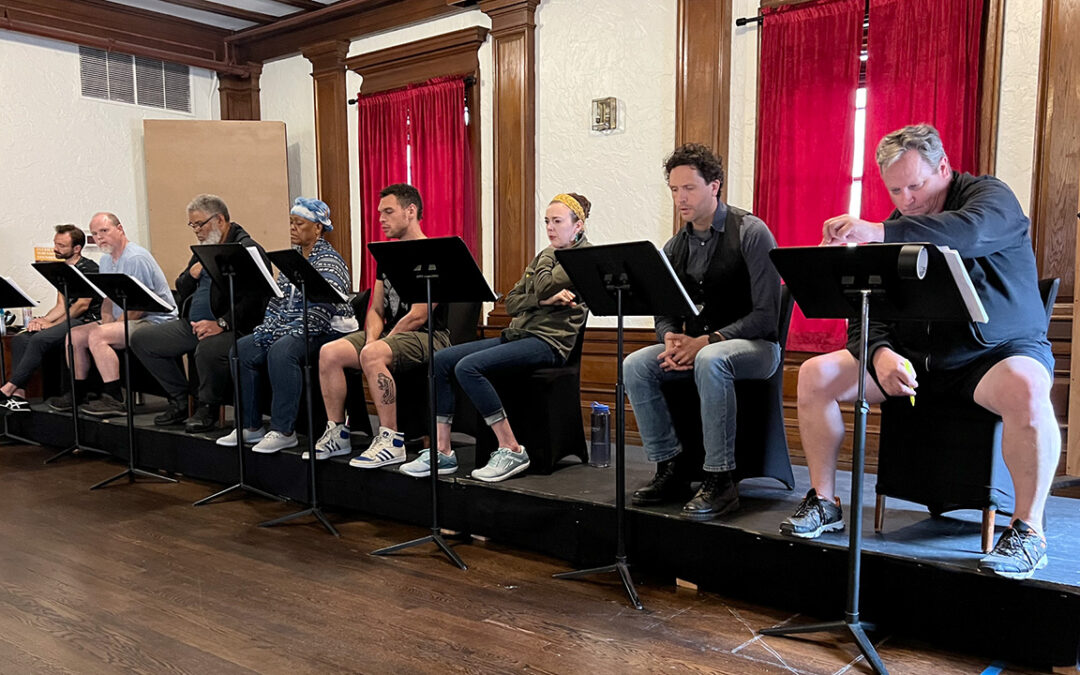
by Robert Bowie, Jr. | Jun 15, 2023 | Featured, Man Machine, Plays
The staged reading of The Grace of God & The Man Machine went very well. It had energy. It came alive.
A staged reading is a collaborative stress test for the words of the story but without the action. Its success or failure for me is measured by the energy generated by the words of the play, delivered by highly talented actors in character without the aid of action on the stage.
A stage play is different. It is an art form, caught between the novel — where the story blooms in the imagination of the reader — and the movie — where the story is told for the screen and, once told, never changes.
The theater performance is the same as the other two in that it is first created by words but it is different because it is delivered to its audience live.
We were blessed with eight characters performed by gifted actors who brought the words alive, so we could see if the play created that energy we were looking for and, in cases where it did not, make the changes needed so they do.
A few nights before Onaje opened at the NYCFringe, I was honored to have dinner with the famous Broadway producer and founder of the Commercial Theatre Institute (CTI), Tom Viertel. I asked him on opening night if he could tell if he had a hit play. He said yes. He told me to sit in the back of the theater where you could see the audience, and then look for any movement — searching for a handkerchief, unwrapping candy, or looking at the program — any motion other than full concentration on the stage. This was evidence of loss of focus, and should be marked in the text.
At ten o’clock, the day of the reading, eight professional and highly successful professional actors met Steve Eich for the first time and they began reading the play together. They had all been provided the script before, but now Steve’s direction was creating a harmony that would create this energy. They broke for lunch at 1:00, and then began their practice performance with editing and interruptions to bring that harmony to the process. I was very impressed by each actor after they finished, and broke for dinner at 5:30 to return, dressed in black for the reading at 7:00.
What happened at seven o’clock was quite remarkable. Each of the actors had become their characters, and I found myself twice lost in the words that I had written, and rediscovered the power of the play exclusively through the interactions of the actors.
At the end of the first act, I was quite surprised and pleased, because there was an extended ovation from what had been a quiet crowd. I had done what Tom Viertel told me to do. I had watched the crowd. They hadn’t moved, and when anyone did move I marked the script.
More importantly, I had felt the energy from the stage and I had been moved by this remarkable collaborative stress test. It worked.
On to the next step.
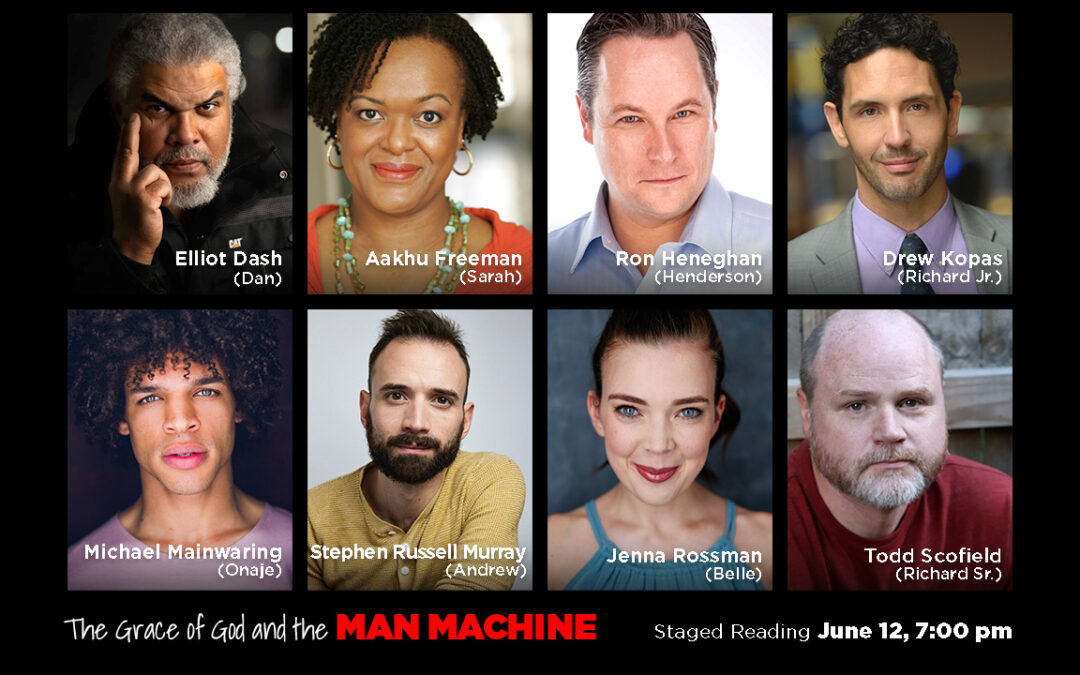
by Robert Bowie, Jr. | Jun 12, 2023 | Featured, Man Machine, Plays
It’s TONIGHT, Monday night. Join us! Please use this link to RSVP:
https://robertbowiejr.com/rsvp
Our one-night-only staged reading at Chesapeake Shakespeare Studio Theatre in Baltimore is THIS MONDAY, June 12, at 7:00 pm.
Directed by Stephen Eich, former Managing Director of Chicago’s Steppenwolf Theatre, and starring a fantastic ensemble of talented actors, this staged reading of The Grace of God and the Man Machine promises to be an exceptional night of live theater you don’t want to miss.
And it’s free!
We’re encouraging theater owners and artistic directors in the Baltimore/DC area to come experience the play, and would love to have you there in the audience.
Chesapeake Shakespeare Studio Theatre
206 E. Redwood St.
Baltimore, MD 20212 (map).
Parking one block away at:
Arrow Parking, 204 E. Lombard St., Baltimore, MD (map).
Doors open at 6:30, performance begins at 7:00.
Please CLICK HERE to RSVP: https://robertbowiejr.com/rsvp
Be there or be square!

by Robert Bowie, Jr. | Jun 6, 2023 | Featured, Man Machine, Plays
Meet our cast of characters:
Dan, a Chesapeake Bay oysterman, his wife Sarah, Henderson, an ex-cop, Richard Jr., a cowboy driving a convertible, Onaje, a hitchhiker navigating with a sextant, Andrew, a civil rights worker, Belle, a truck stop waitress, and Richard Sr., a Chesapeake Bay oysterman.
Meet our amazing cast:
Our staged reading at Chesapeake Shakespeare Company is coming up, Monday, June 12, 7:00 pm. Thanks to our casting director, Barbara Pinolini, we are thrilled to have assembled an incredible array of talented professional actors from the Baltimore/DC area: Elliot Dash (Dan), Aakhu Freeman (Sarah), Ron Heneghan (Henderson), Drew Kopas (Richard Jr.), Michael Mainwaring (Onaje), Stephen Russell Murray (Andrew), Jenna Rossman (Belle), Todd Scofield (Richard Sr.).
Meet our accomplished director:
Stephen Eich is a former Managing Director of Chicago’s Steppenwolf Theatre, where he produced over 125 productions including the 1993 TONY-nominated The Song of Jacob Zulu (featuring Ladysmith Black Mambazo), as well as the 1990 TONY-winning Best Play, The Grapes of Wrath. He also produced Steve Martin’s award-winning Picasso at the Lapin Agile at Steppenwolf, before taking it to Los Angeles, New York, San Francisco and England and the National Tour.
Join us this Monday night!
The performance is free. We’re looking for theater owners and artistic directors in the Baltimore/DC area to host future professional performances (and also supporters of live theater).
Chesapeake Shakespeare Studio Theatre
206 E. Redwood St.
Baltimore, MD 20212 (map).
Parking one block away at:
Arrow Parking, 204 E. Lombard St., Baltimore, MD (map).
Doors open at 6:15, performance begins at 7:00.
Please CLICK HERE to RSVP: https://robertbowiejr.com/rsvp
Hope to meet you there!

by Robert Bowie, Jr. | May 30, 2023 | Featured, Man Machine, Plays
As our staged reading of The Grace of God & The Man Machine gets ready for its performance we are getting more inquiries about the cost of admission.
It’s FREE!
We are actively courting the artistic directors of professional theaters in the Washington/Baltimore area and suburbs to find a home for The Grace of God & The Man Machine, and have invited them to come see the play at a staged reading, Monday, June 12 at the Chesapeake Shakespeare Studio Theatre in the Financial District of Baltimore.
Director Stephen Eich will take over the theater the morning on June 12th. He and Casting Director Barbara Pinolini have hand-picked some of the finest actors in the Washington/Baltimore area (more on them next week). Many of these actors will likely be meeting for the first time, coming together to create two families and a history of love and conflict from eight very complex, often humorous characters.
A little after noon, they will take a lunch break, then continue to rehearse the play until 5:30 or so to break for dinner.
Come watch this happen. It’s a highly emotional play with great humor and the actors are exhilarating. Come early before 7:00 pm. The cash bar will be open. Stay afterward for the talkback with Steve, Barbara, the actors, and myself. Feel the play. Be part of theater working. All for free.
Chesapeake Shakespeare Studio Theatre
206 E. Redwood St.
Baltimore, MD 20212 (map).
Parking one block away at:
Arrow Parking, 204 E. Lombard St., Baltimore, MD (map).
Doors open at 6:15, performance begins at 7:00.
Please CLICK HERE to RSVP: https://robertbowiejr.com/rsvp
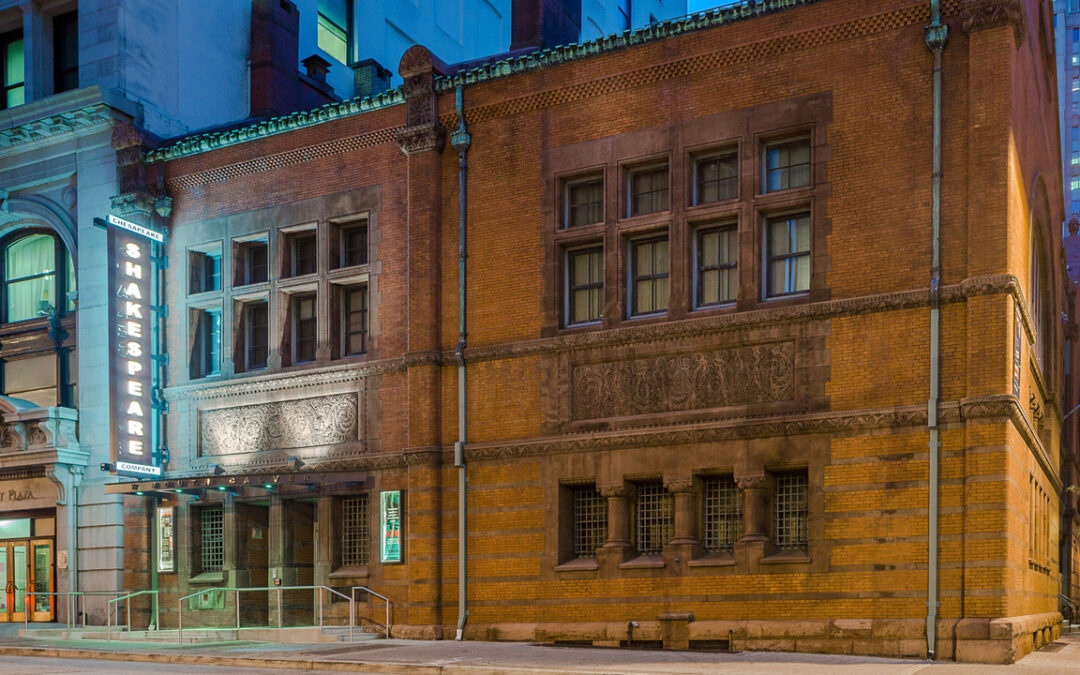
by Robert Bowie, Jr. | May 23, 2023 | Featured, Man Machine, Personal
Last week, I wrote about the untimely death, due to Covid, of my play, The Grace of God & The Man Machine, just before its Off-Broadway debut, but I also wrote about its planned rebirth on Monday, June 12th at 7pm at the Chesapeake Shakespeare Studio Theatre in Baltimore’s financial district.
This week, I wanted to share the history of where the play came from over 50 years ago. (You have marked your calendar for Monday night, June 12th, right?)
In the summer of 1967, I was a teenage boy who travelled for the first time down south from my home in Massachusetts to the eastern shore of Maryland. Less than a month later, not far from Easton, where I was staying, the civil rights riots in Cambridge, Maryland exploded late that July, when H. Rap Brown, head of the Student Nonviolent Coordinating Committee, had been invited to lead a peaceful protest in support of the Civil Rights Act of 1964, which had not been recognized down in Cambridge.
Activist Gloria Richardson, who had invited Rap to speak, admitted later that he went beyond the assigned bounds, but also asserted that the black neighborhoods were set on fire in retaliation, and the white-operated fire trucks refused to put out the fires.
Shortly thereafter, Governor Spiro Agnew went down to Cambridge and chastised the black population for lighting their homes on fire. Agnew got national headlines and, as a result, Richard Nixon asked him to be his running mate in the upcoming presidential elections.
Within the first two days, I knew I was an outsider. The blacks in Easton would not make eye contact with a white boy whose hair was a little longer than the buzz cuts of his contemporaries in Easton. When I was invited to swim at the Easton Country Club, the lifeguard rushed over to stop me, saying if I wanted to swim there, I would have to wear a bathing cap.
I looked around. Not even the girls swimming in the pool were wearing bathing caps. I felt uneasy.
That afternoon, I tasted Chesapeake Bay blue crab for the first time at The Crab Claw restaurant overlooking the Bay. My host, a local doctor, snapped his fingers and used the N-word to call the waiter to bring more crabs and more beer as the afternoon progressed. I felt very uneasy. Similar experiences leading up to the riots that steamy July never left me.
I was forever changed by these experiences and this play came from the scars that were left more than 50 years ago.
Several months ago, after the Off-Broadway run was cancelled, I got an unexpected phone call from Steve Eich, telling me that he had read the play and he would like to talk.
Steven Eich is a remarkable figure in American theatre. Years ago, I had been fortunate to have bought a single ticket to see his Broadway production of The Grapes of Wrath, which had just received a Tony Award for Best Play.
- Steve has been Managing Director of the Steppenwolf Theatre in Chicago, 1979–1995.
- Managing Director of Geffen Playhouse in Los Angeles, 2000–2008.
- Executive Director of the Pasadena Playhouse, Pasadena, 2009–2012.
He has been an award-winning producer and director, whose credits include The Grapes of Wrath, Picasso at the Lapin Agile, Paul Simon’s The Capeman, The Trial of an American President, and Frank The Man, about Frank Sinatra.
Steve has been a great champion of the play, and wants to present it in the area where the events of the play took place. The goal of our June 12th reading is to find supporters and a venue for its future life. It’s going to be an exciting night, with a talkback afterward where you can meet Steve and the actors.
I would greatly appreciate it if you can help me spread the word. Feel free to like this post and share it, and I will see you there.
Chesapeake Shakespeare Studio Theatre
206 E. Redwood St.
Baltimore, MD 20212 (map).
Parking one block away at:
Arrow Parking, 204 E. Lombard St., Baltimore, MD (map).
Doors open at 6:15, performance begins at 7:00.
Please CLICK HERE to RSVP: https://robertbowiejr.com/rsvp

by Robert Bowie, Jr. | May 16, 2023 | Featured, Man Machine, Plays
Mark your calendar for Monday night, June 12!
Several months ago I was contacted by Stephen Eich. He told me that he had read my play, The Grace of God & The Man Machine, and he wanted to talk about it. This was an amazing surprise for several reasons:
First, Steven Eich is a remarkable figure in all aspects of American theatre. He has been Managing Director, Steppenwolf Theatre Chicago, 1979-1995. Managing Director, Geffen Playhouse, Los Angeles, 2000-2008, Executive Director, Pasadena
Playhouse, Pasadena, 2009-2012.
He has also been an award-winning producer and director. To name a few: The Grapes of Wrath, TONY AWARD BEST PLAY 1990, Producer; Picasso at the Lapin Agile, Producer, 1993–Present; Paul Simon’s The Capeman, Co-Producer 1996–1998; The Trial of an American President, NYC 2016, Director; Frank The Man, Music-Director/Producer.
Second, I was still mourning what I concluded was the end of life for this wonderful play after its off Broadway closing before it opened, after years of preparation and delays, because its producer went under due to Covid closures.
Over the last several months, Steve and I have gone over the play page by page, line by line, and finally we met last month in Baltimore so Steve could meet with Barbara Pinolini, the very well respected actress and casting Director from Washington DC with whom steve wanted to work to get his professional cast and to secure the theater he wanted for a staged reading in the Baltimore/Washington area. Since the play concerns the civil rights riots in the eastern shore of Maryland, in 1967 and its aftermath, Steve’s theory is because it happened in the Maryland/ D.C. Area this is where its professional rebirth should occur.
Please join us! Mark your calendar for Monday night, June 12. The performance is free. We’re looking for theater owners and artistic directors in the Baltimore/DC area to host future professional performances (and also supporters of live theater).
Chesapeake Shakespeare Studio Theatre
206 E. Redwood St.
Baltimore, MD 20212 (map).
Parking one block away at:
Arrow Parking, 204 E. Lombard St., Baltimore, MD (map).
Doors open at 6:15, performance begins at 7:00.
Please CLICK HERE to RSVP: https://robertbowiejr.com/rsvp

by Robert Bowie, Jr. | Feb 7, 2023 | Featured, Personal, Travel
Twelve or 13 years ago, in Indonesia, I saw a homeless woman resting in the shadows of a side street holding a sick child in her arms. She looked up indifferently at me as I passed through the shadows, but I saw her eyes.
They were part of a portrait of incurable poverty, not drugs or alcohol. I saw no family, no food, no resources and no hope.
It is a moment I can’t forget.
She was so beaten down. I could not tell her age. Her child was so young and quiet. Her eyes seemed vacant and without hope. It was a combination of abject poverty and also a renaissance portrait of Madonna and child.
Without thinking, I surprised myself. I reached into my pocket and handed her what I had. I have no idea how much money I gave to her. It was everything but it was a foreign currency.
I was instantly embarrassed at this unexpected burst of emotions, so I didn’t look back. I just kept walking.
I have come to conclude that no matter where we go, we live in our American culture, its vision of itself, and only caricatures of the outside world which have been baked into me and I take for granted. As Americans, we believe ourselves to be kind, but while it may be our nature to be kind, we protect ourselves from caricatures, like the poverty of strangers when it becomes too much.
When the caricatures fall apart, a different world takes its place.
She was not begging. I just found myself giving her a fistful of money and I kept walking. The money was balled up into my fist when I gave it to her.
I didn’t see her after I gave it to her.
When I turned away, I left the shadows and went into the sunlight and tried to leave it all behind. To forget about what I saw and what I had done. I was surprised to find that she had gotten up and followed me. She’d put her hand on my shoulder. Was she touching me to acknowledge the amount of money I had given her?
Yes I think so, but I think it was something more.
She pointed at my camera as if to say, “thank you and remember me.” She did not smile as I took her picture. She just looked at me with those eyes I can’t forget. I don’t need the photo but I return to it off and on.
I wonder if they are both gone now. It was a while ago. I still have that photograph. It is posted here. I want to remember her and never think of her as a caricatures of poverty.









